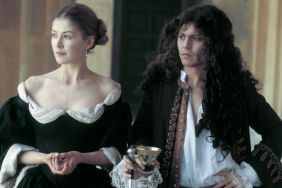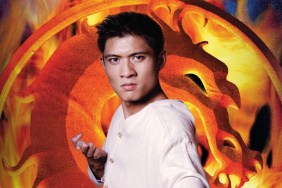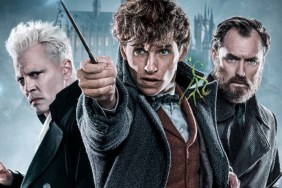Johnny Depp as John Wilmot, 2nd Earl of Rochester
Samantha Morton as Elizabeth Barry
John Malkovich as King Charles II
Paul Ritter as Chiffinch
Stanley Townsend as Keown
Francesca Annis as Countess
Rosamund Pike as Elizabeth Malet
Johnny Vegas as Sackville
Richard Coyle as Alcock
Hugh Sachs as Ratcliffe
Tom Burke as Vaughan
Rupert Friend as Billy Downs
Jack Davenport as Harris
Trudi Jackson as Rose
Claire Higgins as Molly Luscombe
Summary:
“The Libertine” might have been a great thematic follow-up to last year’s “Stage Beauty” and the film based on Shakespeare’s own “Merchant of Venice”, but Stephen Jeffrey’s great writing and the fine performances are marred by terrible production values.
Story:
Sex-crazed poet and playwright John Wilmot, the 2nd Earl of Rochester (Johnny Depp), has been commissioned by King Charles II (John Malkovich) to write him a play, but Rochester is so smitten with winning the heart of his new protégé, Elizabeth Barry (Samantha Morton), that his debaucherous lifestyle eventually catches up with him.
Analysis:
There’s very few ways you can go wrong when making a period piece with a cast as strong as this one–just having Johnny Depp, Samantha Morton and John Malkovich alone would make any director drool–and yet, somehow director Laurence Dunmore’s first effort has indeed gone wrong. It’s a shame, because it could have been fodder for another great film based in the British theatre, like two of last year’s best, “Stage Beauty” and Depp’s own “Finding Neverland.”
The story behind this movie goes back to actor John Malkovich, who portrayed the Earl in Stephen Jeffreys’ stageplay “The Libertine,” and who loved the material enough to produce a film version. Knowing that the success of a film would rely on someone younger and better known, he stepped aside when Johnny Depp agreed to play the lead, and then he brought on commercial and video director Laurence Dunmore, with whom Malkovich had done a television commercial.
At first glace, it would be a worthy endeavor, because the Earl of Rochester was a vibrant and lively character, as legendary as the Marquis de Sade for his debauchery, and Jeffreys’ beautiful writing gives a suitably bawdy twist to the language of Shakespeare.
This is also another perfect role for Johnny Depp, who gets to play it at his most flamboyant and perverse, whether he’s feeling up his kidnapped young wife or amusing his circle of friends with stories of orgies and debauchery. The movie starts out with a great monologue from Depp that is worthy of the great Bard himself. The first half of the film rolls along with a lot of raunchy humor, but there’s also a tragic nature to the character, not only because he was unable to win over the woman he loved, but also because he succumbed to alcoholism and syphilis by the age of 33. It’s the latter part that allows Depp to show off his prowess as an actor, pulling off an even more impressive performance when his looks are destroyed by disease.
Depp’s leading lady is not to be disregarded though, as Samantha Morton shows that she can keep up with Depp every step of the way, and the fact that she spurns his affections and betrays him just makes their relationship more interesting. In one memorable scene, they verbally try to one-up each other, and the sparks truly fly between them.
As fun as it is to watch these two fine actors go at it, the entire movie is marred by poor directorial choices and production values that make it one of the ugliest period pieces ever put on film. Sure, a lot of the grimy look was intentional, in order to show a less glamorous side of 17th Century London, but the costumes and Depp’s make-up are sub-standard to what we’re used to seeing in this type of production. Dunmore, a commercial and video director, makes a lot of mistakes, from using handheld cameras to other camera tricks and editing to try to keep the dialogue-heavy piece more interesting. None of that is really necessary, and it ends up taking away from two fine performances. The worst decision involves the lighting, which seems almost non-existent, as if Dunmore was paying tribute to “Dogme 95” by only using natural lighting. In the case of the 17th Century, that would mean every scene was only lit by candlelight, and it really looks it, since the entire movie is dark and gray.
With Depp taking over his stage role, Malkovich instead moves over to the famously flamboyant King Charles II, a royal played by Rupert Everett in “Stage Beauty,” but Richard Coyle steals many a scene as Rochester’s appropriately named assistant Alcock, while offering some of the movie’s best laughs. The production uses some of the cast from “Pride & Prejudice,” a far superior period piece, including Tom Hollander, Kelly Reilly and Rosamund Pike, the latter being the weakest link of the cast as Rochester’s faithful wife.
The Bottom Line:
Those who enjoy the glamour and theatricality of period pieces might appreciate Stephen Jeffrey’s words and the fine performances by Depp and Morton. For most part “The Libertine” is ugly and unwatchable due to poor direction and production choices. It’s depressing to think how much better this could have been in the hands of a skilled director.
The Libertine opens in New York and Los Angeles for a special one-week Oscar run before its official release in January.










